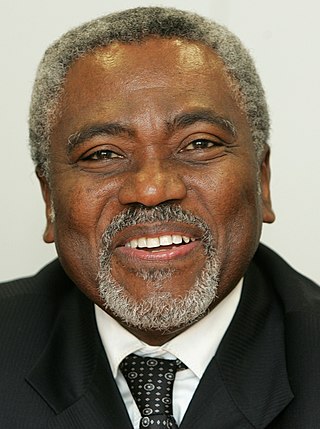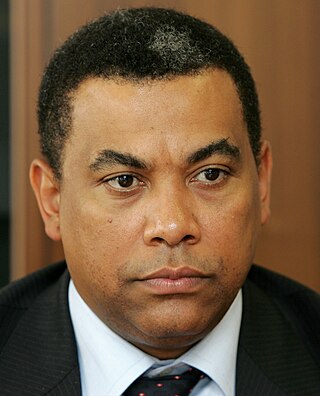The earliest known human settlements in what is now the Democratic Republic of the Congo have been dated back to the Middle Stone Age, approximately 90,000 years ago. The first real states, such as the Kongo, the Lunda, the Luba and Kuba, appeared south of the equatorial forest on the savannah from the 14th century onwards.

Laurent-Désiré Kabila or more succinctly, Laurent Kabila, was a Congolese revolutionary and politician who served as the third President of the Democratic Republic of the Congo from 1997 until his assassination in 2001.

Joseph Kabila Kabange is a Congolese politician who served as President of the Democratic Republic of the Congo between January 2001 and January 2019. He took office ten days after the assassination of his father, President Laurent-Désiré Kabila in the context of the Second Congo War. He was allowed to remain in power after the 2003 Pretoria Accord ended the war as the president of the country's new transitional government. He was elected as president in 2006 and re-elected in 2011 for a second term. Since stepping down after the 2018 election, Kabila, as a former president, serves as a senator for life.

Raymond Ramazani Baya was a Congolese politician. He served as the foreign minister of that country under the transitional government following his appointment to that post on 23 July 2004, by vice-president Jean-Pierre Bemba, who was allowed to appoint the foreign minister.
The Sun City Agreement was an award winning agreement that was signed between some of the warring parties in the Second Congo War on 2 April 2003 at the luxury South African casino resort of Sun City, as a result of the Inter-Congolese dialogue (ICD). Delegates hoped that this would be a historic "final act", ending more than four years of war and setting up a government of national unity.

Étienne Tshisekedi wa Mulumba was a Congolese politician and the leader of the Union for Democracy and Social Progress (UDPS), the main opposing political party in the Democratic Republic of the Congo (DRC). A long-time opposition leader, he served as Prime Minister of the country on three brief occasions: in 1991, 1992–1993, and 1997.
The Movement for the Liberation of the Congo is a political party in Democratic Republic of the Congo. Formerly a rebel group operating in the Democratic Republic of Congo that fought the government throughout the Second Congo War, it subsequently took part in the transitional government and is one of the main opposition parties.

The Transitional Government of the Democratic Republic of Congo was tasked with moving from the state riven by the Second Congo War (1998–2003) to a government based upon a constitution agreed on by consensus. In 2001, President Laurent Kabila was assassinated, and his son Joseph Kabila was named head of state.

Antoine Gizenga was a Congolese (DRC) politician who was the Prime Minister of the Democratic Republic of the Congo from 30 December 2006 to 10 October 2008. He was the Secretary-General of the Unified Lumumbist Party.

Jean-Pierre Bemba Gombo is a politician in the Democratic Republic of the Congo (DRC). He has served as the DRC's Vice Prime Minister and defence minister since 2023. He was previously one of four vice-presidents in the transitional government of the Democratic Republic of the Congo from 17 July 2003 to December 2006. He led the Movement for the Liberation of the Congo (MLC), a rebel group turned political party. He received the second-highest number of votes in the 2006 presidential election. In January 2007, he was elected to the Senate.

Azarias Ruberwa Manywa is a Congolese politician, lawyer, and public figure. During the Second Congo War he was Secretary-General of the Rassemblement Congolais pour la Démocratie (RCD-G) rebel group. Following the war he was one of the vice-presidents in the transitional government of the Democratic Republic of the Congo between 2003-2006. He has also been the leader and president of RCD-G's political party since 2003. He is a member of the Banyamulenge community of South Kivu who belong to the Tutsi ethnic group.

François-Joseph Mobutu Nzanga Ngbangawe is a Congolese politician. A son of the long-time President Mobutu Sese Seko, he served in the government of the Democratic Republic of the Congo under President Joseph Kabila from 2007 to 2011, initially as Minister of State for Agriculture and subsequently as Deputy Prime Minister for Basic Social Needs. He was dismissed from the government in March 2011. In 2008, he founded the Union of Mobutist Democrats as the successor to his father's Popular Movement of the Revolution and has led the party since.

Antipas Mbusa Nyamwisi is a politician and former rebel leader in the Democratic Republic of the Congo. He leads the Forces for Renewal political party and was Minister of Decentralization and Urban and Regional Planning until September 2011 when he resigned to run for president. He was previously the Minister of Foreign Affairs from 2007 to 2008.

Olivier Kamitatu Etsu politician of the Democratic Republic of the Congo, and former Planning Minister in the government of Matata Ponyo Mapon and the leader of the Alliance for the Renewal of Congo (ARC) political party. Kamitatu is the President of the Africa Liberal Network.
Congolese history in the 2000s has primarily revolved around the Second Congo War (1998–2003) and the empowerment of a transitional government.

Alexis Thambwe Mwamba is a Congolese politician who has assumed various political roles and offices since the early 1980s going from Minister of Public Works, Minister of State Portfolio, Minister of Transportation, Minister of Planning, Minister of Foreign Affairs and recently in December 2014, he was appointed Minister of Justice of the Democratic Republic of the Congo.

Emmanuel Dungia was a diplomat of the Democratic Republic of Congo (DRC) and author of the political book: Mobutu and the money of Zaïre: the revelations of a diplomat, former Secret Services agent. The latter includes the report prepared for the International Monetary Fund by Erwin Blumenthal, former Director of Foreign Affairs of the Bundesbank. Dungia was also imprisoned but was eventually acquitted by the Congolese government for his alleged involvement in a plot to overthrow Laurent Kabila who was assassinated 16 January 2001.
The Congolese Rally for Democracy–Goma was a faction of the Congolese Rally for Democracy, a rebel movement based in Goma, Democratic Republic of the Congo (DRC) during the Second Congo War (1998–2003). After the war, some members of the group continued sporadic fighting in North Kivu. The movement also entered mainstream politics, participating in democratic elections with little success.

General elections were held in the Democratic Republic of the Congo on 30 December 2018, to determine a successor to President Joseph Kabila, as well as for the 500 seats of the National Assembly and the 715 elected seats of the 26 provincial assemblies. Félix Tshisekedi (UDPS) won with 38.6% of the vote, defeating another opposition candidate, Martin Fayulu, and Emmanuel Ramazani Shadary, backed by the ruling party PPRD. Fayulu alleged that the vote was rigged against him in a deal made by Tshisekedi and outgoing President Kabila, challenging the result in the DRC's Constitutional Court. Different election observers, including those from the country's Roman Catholic Church, also cast doubt on the official result. Nonetheless on 20 January the Court rejected his appeal and declared Tshisekedi as the winner. Parties supporting President Kabila won the majority of seats in the National Assembly. Félix Tshisekedi was sworn in as the 5th President of the Democratic Republic of the Congo on 24 January 2019, making it the first peaceful transition of power in the country since it became independent from Belgium in 1960.

Ève Bazaiba Masudi is a Congolese lawyer, politician, and human rights activist. As of May 2019, she served as the Secretary General of the Movement for the Liberation of the Congo (MLC) political party. She is Deputy Prime Minister and Minister for the Environment since 2021.














